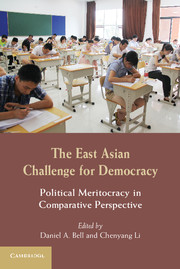Book contents
- Frontmatter
- Dedication
- Contents
- Contributing Authors
- Acknowledgments
- Introduction
- Section I The Theory of Political Meritocracy
- Section II The History of Political Meritocracy
- 6 Between Merit and Pedigree
- 7 A Society in Motion
- 8 Meritocratic Democracy
- Section III Realizing Political Meritocracy Today
- Index
- References
6 - Between Merit and Pedigree
Evolution of the Concept of “Elevating the Worthy” in Pre-imperial China
Published online by Cambridge University Press: 05 June 2014
- Frontmatter
- Dedication
- Contents
- Contributing Authors
- Acknowledgments
- Introduction
- Section I The Theory of Political Meritocracy
- Section II The History of Political Meritocracy
- 6 Between Merit and Pedigree
- 7 A Society in Motion
- 8 Meritocratic Democracy
- Section III Realizing Political Meritocracy Today
- Index
- References
Summary
Western admirers of Chinese civilization – from the French intellectuals of the age of Enlightenment, to the doyen of modern Sinology, John K. Fairbank (1907–91), to countless current scholars – remain fascinated with China's perceived ideology and practice of meritocracy. Doubtlessly, these admirers have the point. The idea of “elevating the worthy” (shang xian 尚賢) became one of the cornerstones of China's political ideology ever since the Warring States period (Zhanguo 戰國, 453–221 b.c.e.); through much of the imperial period most of the males were technically legible for promotion into the government apparatus; and Chinese history provides not a few examples of persons from a relatively humble background who made their way to the top of the political ladder. In all these aspects, Chinese civilization differs markedly from aristocratic cultures elsewhere, such as medieval Europe, in which the pedigree normally played the decisive role in determining one's future.
This background makes it tempting to proclaim meritocracy to be an essential feature of Chinese civilization, such as, supposedly, the family-oriented ethics, ritual-based social hierarchy and the monarchic political system. Yet a closer look at Chinese history would disclose not only that meritocratic ideas and practices did not develop before the Warring States period, but also that their introduction was accompanied by multiple tensions. These tensions, for example, between the principle of “elevating the worthy” and the ongoing importance of family and of pedigree; between meritocratic government and the hereditary monarchy; and, most significantly, among conflicting views of “worth” (xian 賢) and “merits” (gong 功) stand at the focus of my chapter. In what follows, through highlighting ideological debates over these issues during the Warring States period, the formative age of Chinese political tradition, and through contextualizing these debates in contemporaneous political practices, I hope to demonstrate the essentially contradictory nature of “elevating the worthy” discourse.
- Type
- Chapter
- Information
- The East Asian Challenge for DemocracyPolitical Meritocracy in Comparative Perspective, pp. 161 - 202Publisher: Cambridge University PressPrint publication year: 2013
References
- 8
- Cited by



